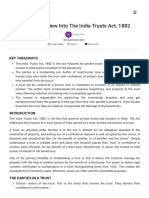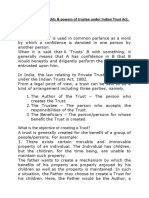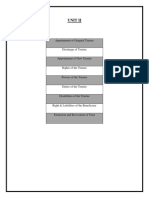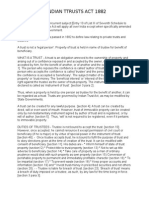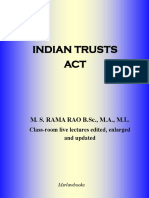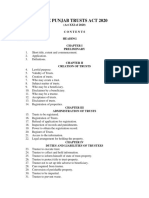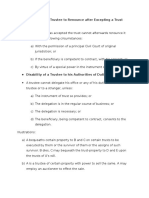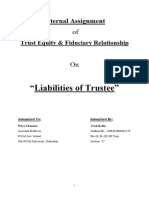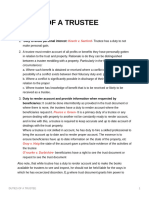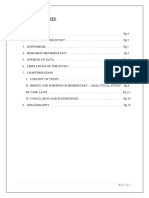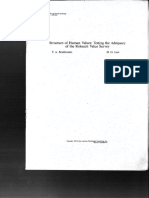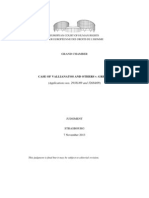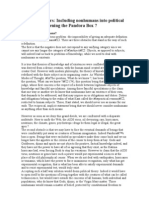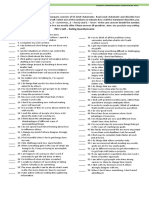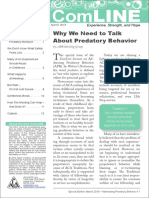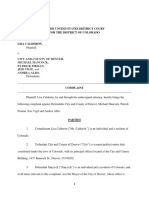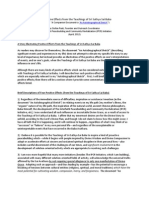DISABILITIES OF TRUSTEES
1. Disability to Delegate
o Basic Principle: A trustee is generally not allowed to delegate their
duties to others. The maxim "delegatus non potest delegare" (a
delegate cannot delegate) applies, meaning that the trustee, being
appointed based on personal trust and confidence, must perform their
duties personally unless expressly authorized by the trust deed or law.
o Legal Reference: Section 47 of the Indian Trusts Act, 1882, prohibits
trustees from delegating their duties, except where the delegation is
permitted by the trust deed, necessary for the performance of duties,
or where the delegation is of a purely ministerial nature.
o Case Law: In Abdul Kayum v. Alibhai (1936), the Privy Council
emphasized that trustees cannot delegate their discretionary powers
unless expressly allowed by the trust instrument. The court held that
unauthorized delegation could lead to a breach of trust, making
trustees liable for any resulting loss.
2. Disability to Purchase Trust Property
o Conflict of Interest: Trustees are prohibited from purchasing the
trust property for themselves. This restriction is based on the principle
that a trustee must avoid conflicts of interest and must not profit from
their position. Purchasing trust property could lead to a situation where
the trustee’s personal interests conflict with their fiduciary duties.
o Statutory Provision: Section 52 of the Indian Trusts Act, 1882,
explicitly prohibits trustees from purchasing trust property for
themselves, either directly or indirectly. This is to prevent any potential
abuse of power and to maintain the integrity of the trustee’s role.
o Judicial Interpretation: The case of Wright v. Morgan (1926) is often
cited in this context, where the court held that a trustee’s purchase of
trust property is voidable at the option of the beneficiaries. The court
stressed that trustees must not place themselves in a position where
their interests conflict with those of the beneficiaries.
3. Disability to Profit from the Trust
o No Profit Rule: Trustees are not permitted to make any personal
profit from the trust, apart from receiving any remuneration that may
be expressly provided for in the trust deed. This rule ensures that
trustees act solely in the interests of the beneficiaries and do not use
their position for personal gain.
o Legal Context: Section 51 of the Indian Trusts Act, 1882, reinforces
the principle that a trustee must not profit from the trust, unless all
beneficiaries, being competent to contract, consent to such profit or
the court allows it.
o Case Example: In Boardman v. Phipps (1967), the House of Lords
ruled that even if a trustee acts honestly and in the best interest of the
trust, any personal profit gained must be accounted for to the trust.
� This case highlights the strict approach taken by courts to ensure
trustees do not misuse their position for personal gain.
4. Disability to Enter into Contracts with the Trust
o Self-Dealing Rule: Trustees are generally not allowed to enter into
contracts with the trust. This restriction is in place to avoid any
potential conflict of interest and to ensure that trustees do not take
advantage of their position to secure favorable terms for themselves.
o Statutory Prohibition: The principle underlying this disability is
derived from the fiduciary duty of trustees to avoid conflicts of interest.
Although not explicitly stated in the Indian Trusts Act, 1882, this
principle is well established in common law.
o Case Law: In Keech v. Sandford (1726), a landmark case in equity, the
court held that trustees must not enter into transactions with the trust,
as this could lead to a conflict of interest and potential exploitation of
the trust’s assets.
5. Disability to Benefit from Trust Information
o Confidentiality of Information: Trustees are not permitted to use
confidential information gained through their position to benefit
themselves. This restriction ensures that trustees do not misuse trust-
related information for personal gain or to the detriment of the
beneficiaries.
o Legal Principle: The duty to maintain confidentiality is an implicit
aspect of a trustee's fiduciary obligations. Any breach of this duty
could lead to the trustee being held liable for any losses incurred by
the trust.
o Relevant Case: In Reading v. Attorney-General (1951), the court held
that an individual in a fiduciary position, such as a trustee, must not
exploit confidential information for personal profit. The ruling
reinforced the idea that trustees must use trust information solely for
the benefit of the beneficiaries.
6. Disability to Invest in Risky Assets
o Prudent Investor Rule: Trustees are required to invest trust property
prudently, meaning they must avoid risky investments that could
endanger the trust assets. Trustees must prioritize the preservation of
capital and the generation of reasonable returns.
o Statutory Guidance: Section 20 of the Indian Trusts Act, 1882,
outlines the types of securities in which trustees are permitted to
invest. Trustees must follow these guidelines and cannot invest in
speculative or high-risk ventures unless explicitly authorized by the
trust deed.
o Judicial Interpretation: In Bartlett v. Barclays Bank Trust Co. Ltd.
(1980), the court held that trustees could be held liable for losses
resulting from imprudent investments. The case emphasized that
trustees must act cautiously and avoid exposing trust property to
unnecessary risks.
7. Disability to Mix Trust Property with Personal Assets
� o Separation of Assets: Trustees are under a strict obligation to keep
trust property separate from their personal assets. Mixing trust
property with personal assets can lead to breaches of trust and
complicate the identification of trust assets, especially in the event of
insolvency.
o Legal Requirement: Section 47 of the Indian Trusts Act, 1882,
implicitly prohibits trustees from mixing trust property with their own
assets. Trustees must ensure that trust property is clearly identifiable
and kept separate at all times.
o Case Law: In Re Hallett's Estate (1880), the court established that
where a trustee has mixed trust funds with their own money, the
beneficiaries have a right to trace the trust property and reclaim it.
This case underscores the importance of maintaining a clear distinction
between trust and personal assets.
8. Disability to Delegate Discretionary Powers
o Non-Delegation of Discretion: Trustees are generally not allowed to
delegate discretionary powers, such as decisions about how trust funds
should be invested or distributed. These powers are vested in the
trustee personally and must be exercised with care and judgment.
o Legal Framework: Section 47 of the Indian Trusts Act, 1882, affirms
that a trustee cannot delegate their discretionary powers unless the
trust deed explicitly allows for such delegation, or it is necessary under
specific circumstances.
o Judicial Perspective: In Speight v. Gaunt (1883), the court ruled that
trustees who delegate their discretionary powers without proper
authority can be held liable for any resulting losses. The case
highlighted that trustees must exercise their own judgment and cannot
pass this responsibility on to others.
9. Disability to Use Trust Property for Personal Purposes
o Prohibition on Personal Use: Trustees are prohibited from using
trust property for personal purposes. This rule ensures that trustees do
not exploit trust assets for their benefit and that the property is used
solely for the purposes intended by the trust.
o Legal Provisions: Although not explicitly covered by a specific section
in the Indian Trusts Act, 1882, this principle is derived from the general
fiduciary duties of trustees. Using trust property for personal purposes
would constitute a breach of trust.
o Relevant Case: In Tito v. Waddell (No. 2) (1977), the court reaffirmed
that trustees must not use trust property for their personal benefit. The
case demonstrated the strict enforcement of fiduciary duties and the
consequences of using trust assets for personal gain.
10. Disability to Change Beneficiaries
o Fixed Beneficiaries: Trustees do not have the power to change the
beneficiaries of a trust. The beneficiaries are determined by the settlor
and are fixed unless the trust deed provides a specific mechanism for
modification.
�o Statutory Position: The Indian Trusts Act, 1882, does not provide
trustees with the authority to alter the list of beneficiaries. This
ensures that the trustee’s role is confined to managing the trust
property according to the terms set by the settlor.
o Case Law: In Re Bowden (1936), the court held that trustees have no
authority to change beneficiaries, even if they believe it would be in
the best interest of the trust. The case emphasized that trustees must
adhere strictly to the trust deed and cannot deviate from the settlor’s
instructions.






